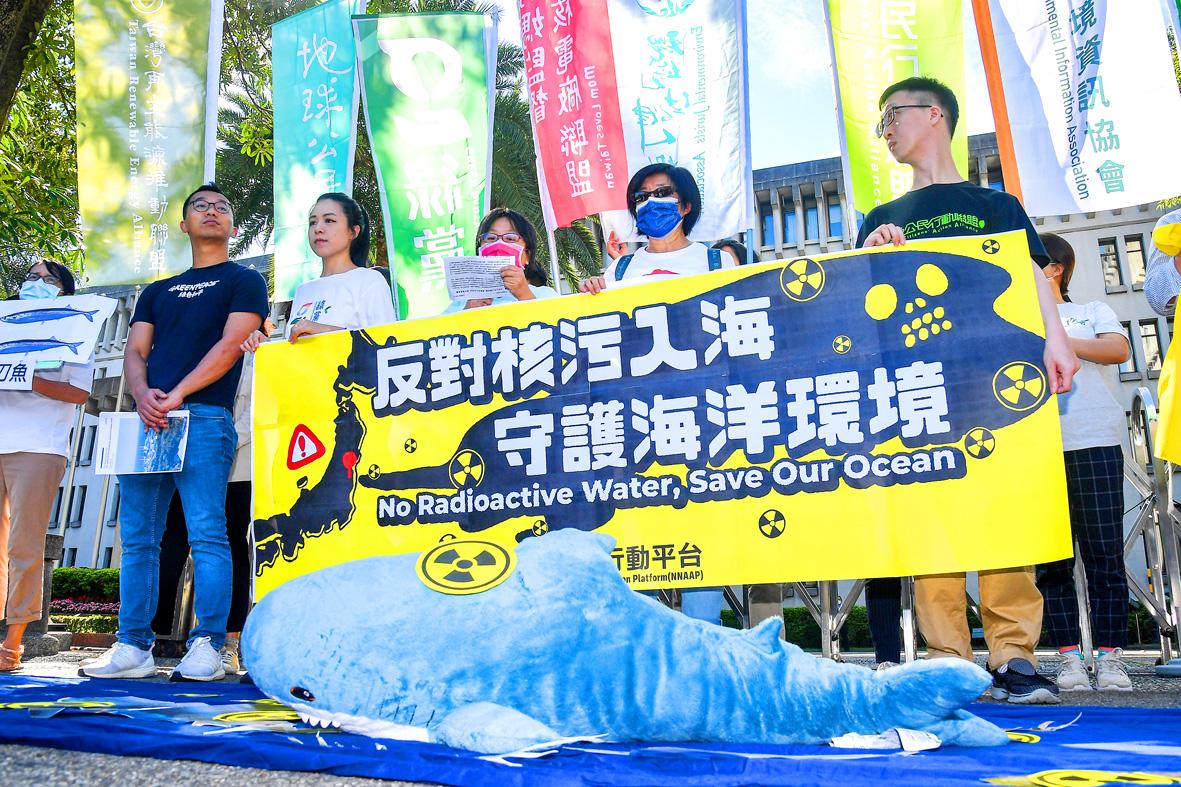The National Nuclear Abolition Action Platform yesterday called on Japan to refrain from dumping contaminated wastewater from the Fukushima Dai-ichi nuclear power plant into the ocean, warning it that it might cause up to 40 years of environmental consequences.
The group held a protest in front of the Ministry of Foreign Affairs in Taipei, prompting the ministry to promise to relay a message to Japan through the nation’s representative office in Tokyo.
The groups first placed a large sheet featuring cutouts of marine creatures on the ground and later added radioactive warning symbols to the sheet, representing the impact of the water from the wrecked plant on the ecosystem.

Photo: CNA
After Tokyo in May began soliciting ideas on how to dispose of the contaminated water, civil organizations in Taiwan jointly sent a letter to the Japanese Ministry of Economy, Trade and Industry urging it not dump it into the ocean, Green Citizens’ Action Alliance secretary-general Tsuei Su-hsin (崔愫欣) said.
However, Japanese media last month reported that Tokyo is planning on releasing the plant’s “treated” wastewater into the ocean, Tsuei said.
Tsai Ya-ying (蔡雅瀅), an attorney with the Wild at Heart Legal Defense Association, said that many migrating fish species that are important to the ecosystem travel along the Kuroshio Current that runs along the east coasts of Taiwan and Japan.
The water would contaminate their habitat, affecting the fishing industry and health of consumers, and racking up costs related to radiation detection, Tsai said, citing data from the Atomic Energy Council.
Japan should continue treating the wastewater on land, she added.
Tsai also called nuclear power operators selfish for not hesitating to pollute the oceans to save relatively little money, adding that the government is biased in their favor.
The supposedly cheap cost of nuclear power is an illusion, as the health and safety costs are passed onto others, she added.
As nuclear particles are carried by currents around the globe, the contamination might affect marine ecosystems intermittently for 30 or 40 years, Citizen of the Earth, Taiwan deputy executive director Tsai Chung-yueh (蔡中岳) said.
Ever since the plant was affected by an earthquake and a tsunami in 2011, Tokyo Electric Power has been continuously filling tanks with water used to cool damaged reactor cores, he said.
“The Fukushima nuclear disaster has not yet been solved,” but keeps on polluting, Tsai Chung-yueh said.
Taiwan-Japan Relations Association Deputy Secretary-General Hsieh Bor-huei (謝柏輝) received the complaint, saying that the ministry takes the matter very seriously.
Since the issue involves matters of environmental protection, and public health and safety, the ministry has many times expressed its concern to the Japanese government, he said.
Not only Taiwan and the international community, but also the Japanese public do not agree with the plan, Hsieh added.
Tokyo is still carefully considering its options before making a final decision, Hsieh said, adding that the ministry would relay the group’s message and urge the government to abide by the principle of transparency while evaluating its options.

An essay competition jointly organized by a local writing society and a publisher affiliated with the Chinese Communist Party (CCP) might have contravened the Act Governing Relations Between the People of the Taiwan Area and the Mainland Area (臺灣地區與大陸地區人民關係條例), the Mainland Affairs Council (MAC) said on Thursday. “In this case, the partner organization is clearly an agency under the CCP’s Fujian Provincial Committee,” MAC Deputy Minister and spokesperson Liang Wen-chieh (梁文傑) said at a news briefing in Taipei. “It also involves bringing Taiwanese students to China with all-expenses-paid arrangements to attend award ceremonies and camps,” Liang said. Those two “characteristics” are typically sufficient

A magnitude 5.9 earthquake that struck about 33km off the coast of Hualien City was the "main shock" in a series of quakes in the area, with aftershocks expected over the next three days, the Central Weather Administration (CWA) said yesterday. Prior to the magnitude 5.9 quake shaking most of Taiwan at 6:53pm yesterday, six other earthquakes stronger than a magnitude of 4, starting with a magnitude 5.5 quake at 6:09pm, occurred in the area. CWA Seismological Center Director Wu Chien-fu (吳健富) confirmed that the quakes were all part of the same series and that the magnitude 5.5 temblor was

The brilliant blue waters, thick foliage and bucolic atmosphere on this seemingly idyllic archipelago deep in the Pacific Ocean belie the key role it now plays in a titanic geopolitical struggle. Palau is again on the front line as China, and the US and its allies prepare their forces in an intensifying contest for control over the Asia-Pacific region. The democratic nation of just 17,000 people hosts US-controlled airstrips and soon-to-be-completed radar installations that the US military describes as “critical” to monitoring vast swathes of water and airspace. It is also a key piece of the second island chain, a string of

The Central Weather Administration has issued a heat alert for southeastern Taiwan, warning of temperatures as high as 36°C today, while alerting some coastal areas of strong winds later in the day. Kaohsiung’s Neimen District (內門) and Pingtung County’s Neipu Township (內埔) are under an orange heat alert, which warns of temperatures as high as 36°C for three consecutive days, the CWA said, citing southwest winds. The heat would also extend to Tainan’s Nansi (楠西) and Yujing (玉井) districts, as well as Pingtung’s Gaoshu (高樹), Yanpu (鹽埔) and Majia (瑪家) townships, it said, forecasting highs of up to 36°C in those areas